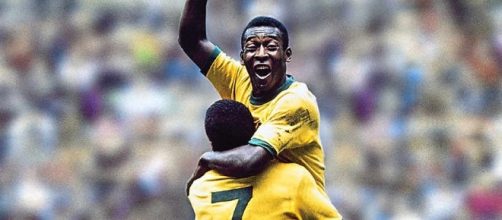There is no sport in the world as popular as Football. As is the case with anything mainstream, the popularity gives rise to rumours and the rumours turn into misinformation. So here is a list of five such stories which started off as rumours but have somehow cemented their place in the mythos and legends in the world of football.
Pele stopped a civil war in Africa
The Brazilian football legend Pele is often credited by major publications and news channels like the TIME magazine, CNN, The Guardian, etc. for stopping one of the bloodiest civil wars in Africa.
Or did he?
From 1967 to 1970, Nigeria was in turmoil over the secession of the state of Biafra. During this time, Pele played for Santos F.C. and the club were on a lucrative money-making tour of Africa. They were scheduled to play the Nigerian national team in the Lagos City stadium. Apparently, Pele's reputation as a genius footballer brought a three-day ceasefire. But there are absolutely no records of this incident. The Nigerian Daily Times and the Nigerian Observer - two major newspapers in the country covered the game extensively and do not mention any ceasefire.
Even in his 1977 autobiography titled 'My Life and the Beautiful Game', Pele does not mention anything about stopping a civil war.
That's a staggering incident to leave out of someone's autobiography.
'Soccer' is an American invention
Americans get a lot of stick for referring to the beautiful game as "soccer" while the rest of the world simply call it football. But ironically, "soccers" origins lie in the United Kingdom. Football's official name is 'Association Football' and soccer is a colloquial term for it that originated around 200 or so years ago.
Similarly, there is a colloquial term for Rugby Football caller "rugger". So basically it is the Brits who carry the blame for "soccer".
India rejected the World Cup
There is an age-old legend in Indian households, that is still perpetuated, that the Indian national football team 'boycotted' the 1950 World Cup in Brazil because FIFA would not allow them to play barefooted.
This however is unfounded and a purely fictional story. There is also another theory as to why the Indians did not feature in Brazil despite qualifying for the tournament. Apparently, they could not afford the travel costs for the long trip. That is another myth.
The real reason why India did not play the World Cup was because they put a greater emphasis on the Olympics and the Asian Games. In 1951 they won gold at the Asian games and in 1956, finished above Great Britain in the final Olympics football rankings.
Wrong decisions even out over the season
You will never get tired of hearing the strongly held belief that a wrong decision by a referee will even out over the course of the season. Perhaps the saying originated from a deeply frustrated fan attempting to assuage his or her vexation.
Strictly speaking, the odds for that are atmospheric. There is no sentient being out there watching over every game, in every stadium, in every league, and in every country that will stand as jury to provide justice for the terrible misfortunes that occur on a football field. Each decision is different from the other and there is little chance that the referees will even it out for you because one of them made a mistake earlier in the season.
Roy Keane ended Alf-Inge Haaland's career
Former Manchester United captain Roy Keane had a reputation for being a hard man on the pitch. He was hated and loathed by rival fans and the hatred reach biblical proportions after his horror tackle on Haaland in a Manchester derby that forced the Norwegian to be stretchered off the pitch.
Keane was shown a straight red for the horrible challenge. Haaland's injury gave rise to the myth that he never played football again. This was simply untrue as he continued playing for another season and only stopped when a serious ligament injury happened on his other leg - yes not the one he injured in the derby. This forced him to retire.

